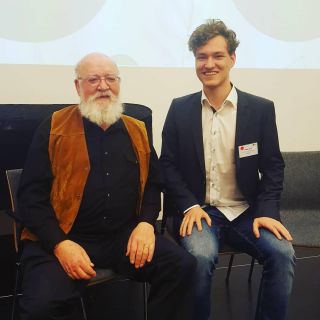Philosophy
Daniel C. Dennett: Tribute to A Philosophical Giant
Personal reflections on the scholarship and kindness of Dan Dennett.
Updated April 21, 2024 Reviewed by Kaja Perina
One of the most influential philosophers and cognitive scientists, Daniel C. Dennett, passed away this week. He was one of the first contemporary philosophers to take naturalism really seriously, i.e. the idea that philosophy and science should be continuous with each other and that science is our best guide to understand the nature of reality.
He engaged closely with science to address fundamental philosophical questions such as “What is the mind?” and “Do we have free will?” At a time when philosophers of mind largely regarded their field as wholly distinct from psychology and neuroscience, Dennett submitted his doctoral dissertation at Oxford in 1965, arguing that the mind is the brain and urging philosophers to take the findings of mind sciences seriously.
His naturalistic attitude has now become widespread in philosophy, even though it was once questioned. Dennett was not interested in drawing stark disciplinary boundaries; instead, he sought to learn from many scientists and to synthesize their results to make progress in our understanding of nature.
Dennett became a pioneer in cognitive sciences and artificial intelligence, deeply influencing many researchers. He also defended Darwinism against its religious critics and reached wide audiences as a member of the so-called "Four Horsemen" of New Atheism, alongside Sam Harris, Richard Dawkins, and the late Christopher Hitchens.
Dennett sought to answer the “why” questions of philosophy by understanding “how” we got there. How did evolution give us free will? How did consciousness evolve? How did cultural evolution give rise to religion? He was inspired by Wilfrid Sellars’ dictum for philosophy: “To understand how things in the broadest possible sense of the term hang together in the broadest possible sense of the term.” Indeed, Dennett might be described as one of the great philosophers; unlike most contemporary philosophers, he built a systematic philosophy of us and our place in the world on thoroughly Darwinian grounds.

Beyond his philosophical and scientific contributions, Dan is also remembered for his kindness and mentorship to young scholars inside and outside of Tufts University. The last few days have seen an outpouring of love for him, with numerous stories of how Dan supported them over the years. Luckily, I was one of them and have been in contact with Dan since 2018. Below are some anecdotes:
I met Dan at a conference in 2018 titled “The Generalized Theory of Evolution,” when he came to Germany to present a plenary lecture at the Düsseldorf Center for Logic and Philosophy of Science.
At the time, I was an undergraduate who had organized a reading group on his influential book “Darwin's Dangerous Idea” a year earlier in Bayreuth, so I was excited to hear him speak in person. After his talk, he was happy to sign books and take pictures with attendees, showcasing his celebrity status among philosophers, scientists, and members of the general public. I was surprised at how forthcoming and happy to chat he was with an undergraduate from Germany.
Influenced by him, I went on to pursue an MA in the Philosophy of Biological and Cognitive Sciences at the University of Bristol, which seemed like the perfect program to do the kind of naturalistic philosophy Dennett advocated. Later, I organized a commentary for the journal Behavioral and Brain Sciences, and couldn’t believe that Dan agreed to co-author it with our group of mostly junior scholars.
I continued on to pursue a PhD at the University of Sydney on the evolution of consciousness and, to my surprise, Dennett was willing to provide me with encouraging feedback. Every Ph.D. student struggles at times with their progress and confidence in whether what they have written is meaningful, so having one of your intellectual heroes provide you with useful suggestions, feedback that they agree with, and like what you have written was incredibly confidence-boosting. Later, I also wrote a paper on the similarities between Dennett and Spinoza, which he greatly enjoyed, uploaded on his website, and shared on social media.
But this was not all. When I entered the job market, Dan helped me apply for jobs by providing me with reference letters. Typically, academics only write letters for students from their own institutions, so I was again surprised at Dan’s kindness to take the time and write letters to the many institutions I applied to.
In December 2023, I recorded an interview with Dan on his autobiography to launch my podcast—one of the last interviews he did. Let me end this personal remembrance with some guidance he gave in this interview to young would-be philosophers.
Walter Veit: Do you have any advice for young philosophers on how they should approach the field now? Should they focus on AI research?
Daniel Dennett: "Well, everybody should focus on it to some degree. I think it's a very important issue because it's immediate. We're not talking about who cares about the singularity in 100 years or 20 years or 500 years. Right now the dangers are there and we've created these new artificial memes/meme systems which can evolve and that could set off an epidemic or a pandemic that we want to avoid at all costs.
I think my advice here is the same as it is to my students in Tufts:
If you think you have a really good idea, blurt it out, then you have something to fix. It may be wrong, but at least you've got something to study, to fix, to criticise, to get help with. And always get help from others.”
References
Interview with Dennett
Veit, W. (2020). Dennett and Spinoza. Australasian Philosophical Review. 4(3), 259–265. https://doi.org/10.1080/24740500.2021.1962653
Veit, W., Dewhurst, J., Dołega, K., Jones, M., Stanley, S., Frankish, K. & Dennett, D.C. (2019). The Rationale of Rationalization – Behavioral and Brain Sciences 43, e53. https://doi.org/10.1017/S0140525X19002164




